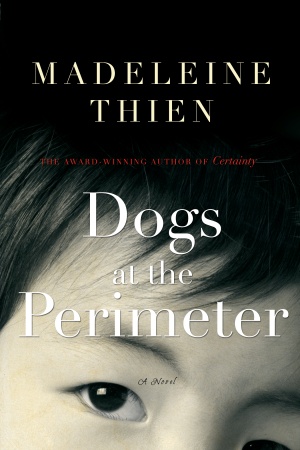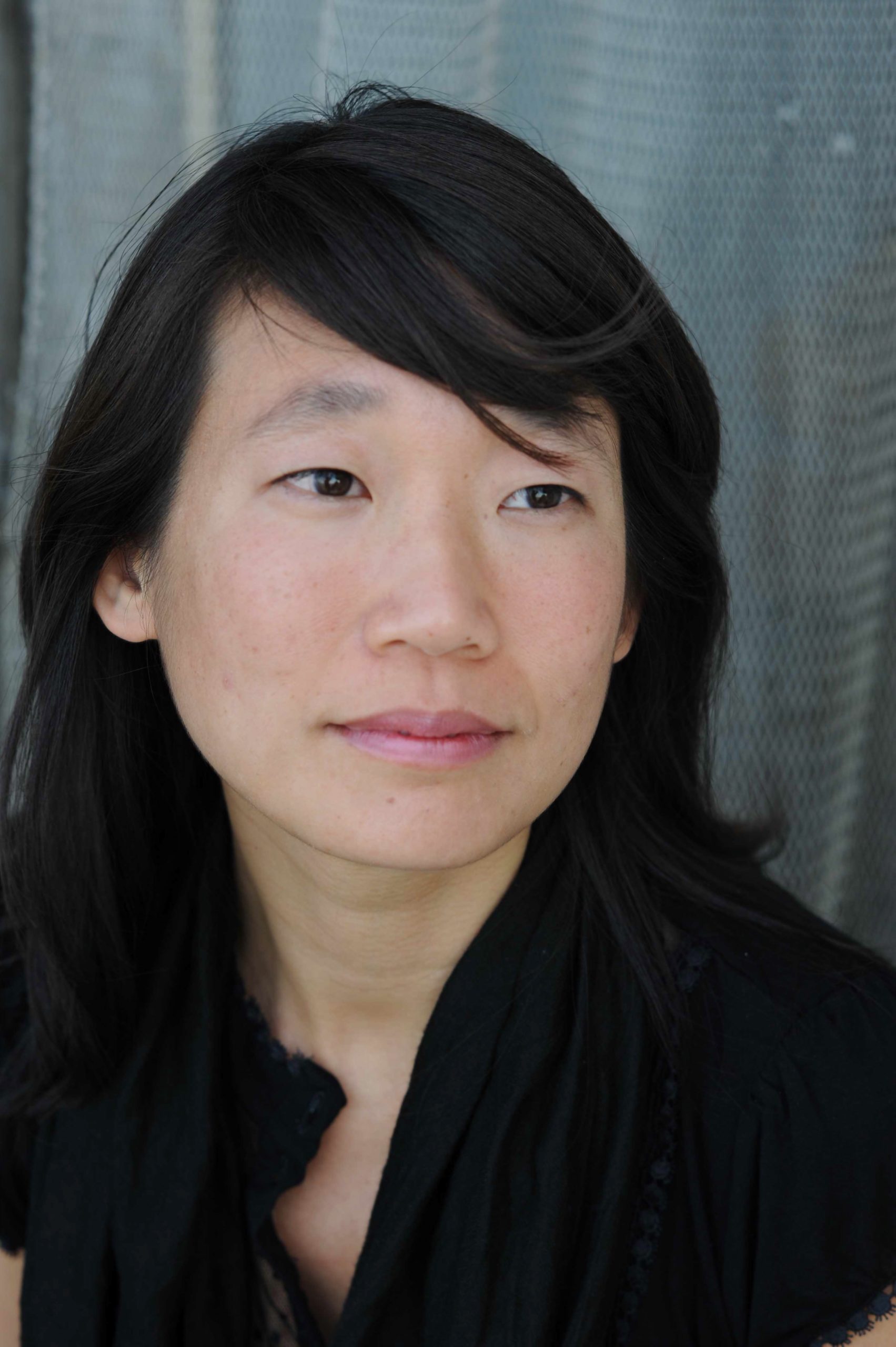Originally published in Room Issue 35.2 “Shaping the Spark” (June 2012). Room would like to congratulate Madeleine on being short-listed for The Man Booker Prize for her latest novel, Do Not Say We Have Nothing (2016).
Originally published in Room Issue 35.2 “Shaping the Spark” (June 2012). Room would like to congratulate Madeleine on being short-listed for The Man Booker Prize for her latest novel, Do Not Say We Have Nothing (2016).
Madeleine Thien is the author of three books of fiction, including Dogs at the Perimeter, her most recent novel. She is a previous finalist for the Kiriyama Prize and the Commonwealth Writers’ Prize for Best First Book, and received the Amazon First Novel Award and the Ovid Festival Prize. Her stories and essays have appeared in Granta, PEN America, Five Dials, and the Asia Literary Review, and her books have been translated into seventeen languages. Born in Vancouver, she now lives in Montreal. Kimberley Alcock, a frequent contributor with Room, spoke with Thien at the 2011 Vancouver International Writers & Readers Festival.
ROOM: Much of your work, some of the stories from Simple Recipes, Certainty, and your new novel, Dogs at the Perimeter, deals with family and migration, and is about characters trying to live in the present while sorting through the trauma of past events. Why is moving between the there and here, then and now, important for you as a writer?
MT: One of the baselines for the books is to move back in time and back in space, and with Janie in Dogs at the Perimeter the immediacy of the present world falls away from her and almost completely disappears. When I was writing the novel, I wasn’t sure if the memories in the book existed in a part of Janie’s mind and whether or not she had access to these memories that the readers see.
ROOM: So you’re saying that because of post-traumatic stress she might not even be fully conscious of the memories, but we as readers have access to them.
MT: She is experiencing the emotion of the memories, but whether she is seeing them is uncertain. And I think that’s true of the character of Matthew in Certainty too.
ROOM: I liked the way that you describe the effects of trauma on both Matthew and Janie, the way you convey their states of mind, and how you articulate for them.
MT: I wanted to have the stories told completely through their sensibilities and not by me as a middle person. I didn’t want to interpret their stories for them. I wanted to see if it was possible in Dogs at the Perimeter for Janie to tell her story unmediated and let the reader go there with her.
ROOM: When I was reading the novel, there was a curious effect; it was as if someone had sliced me open and the story was painful to read but I could read it because it was so beautiful. The beauty of the language carried me through the pain. Is that the effect you were going for?
MT: The question of beauty does arise. How does one make this terror or horror of the Khmer Rouge in any way beautiful? But at the same time, I needed something for the reader to hold onto. It’s a way of making space. And it’s a way of paying attention to particular details. Some of the attention is beautiful. Janie is conscious of certain things and it allows the reader to be conscious of these things. It’s a way of getting around the really terrible parts.
ROOM: The question of details comes up around Matthew in Certainty too. He doesn’t give a narrative arc or tell his family what he went through during the occupation of East Malaysia, but he pieces together his life through details.
MT: Yes, with memories, getting around to the centre of things can be too difficult for an individual. So in the novel, it’s a particular detail, a particular person the characters remember rather than a narrative storyline, and through this remembering of details, something becomes represented, too.
 ROOM: The research for Dogs at the Perimeter is quite extensive. Some of the details seemed as if you lived the experience yourself, it was so realistic. For example, the details about hunger, what the physical and psychic effects of hunger are on the individual. How did you come to the writing with this extensive knowledge?
ROOM: The research for Dogs at the Perimeter is quite extensive. Some of the details seemed as if you lived the experience yourself, it was so realistic. For example, the details about hunger, what the physical and psychic effects of hunger are on the individual. How did you come to the writing with this extensive knowledge?
MT: Hunger was something I started researching for Certainty, and I learned that hunger becomes more excruciating as time goes on. I researched the physi cal manifestation of it and the side effects of it, for example the lack of concentration. Hunger takes over every single thought because all you can think about is where you are going to get your next piece of food. Everything else is secondary. It’s a way the Khmer Rouge had of controlling their victims. They were just not physically strong enough or mentally strong enough to overthrow their captors because of the intense hunger.
ROOM: I wanted to ask you about the female perspective in your work: the way women might perceive and experience what the characters go through in the books in a way that is perhaps unique for their gender.
MT: With Janie and maybe Gail, a protagonist in Certainty, I’d say the way they’re carrying these memories, their families’ histories, might be something to consider. I don’t know if this is particular to women but with Janie, there’s a responsibility she feels, the knowledge that she remembers. This is particularly devastating for her. She’s afraid that she’s passing her emotional trauma on to her child, because it has altered her mind and affected her responses to things.
ROOM: Earlier, we were discussing the idea that memories are encoded in our DNA. Is that something that you thought about?
MT: The research I did for the novel has to do with the chemicals in the body when a woman is pregnant and under extreme stress, such as living through war and refugee camps, and what kind of impact changes in chemistry from these events might have on the developing child. I’m not sure about memories encoded in the DNA. but there is something that’s passed on. For example, in families, memories are often tiptoed around. There are things that go unspoken with people.
ROOM: Parents don’t want children to know about their tragedies or heartbreaks. What’s ironic about that is it creates an emotional chasm between the generations.
MT: Yes, absolutely. You don’t know how to get to that person because they’ve cut off all the links. The child might eventually make sense of the story but the parent is not able to.
ROOM: One of the distinguishing markers of your fiction is your style of moving between the past and present through fragmented narrative. In Dogs at the Perimeter this is done with an extremely deft hand, so much so that as a reader it’s akin to slipping inside the memories alongside the protagonist, Janie. The eloquence of the prose, and the skill with which you move between past and present, assists in dealing with some extremely harrowing subject matter. Was it your intention to balance the style of the work with the subject matter and, in doing so, make it more accessible to the reader?
MT: No. It sounds a bit strange but I was just trying to get the words down. It was more an effect than a deliberate attempt. It was more necessity than stylistics. I think about how much, how far I can go into this experience before I want to close the book. That was a really difficult balance to find … how deep in the horror could I go? As a writer and reader, you become very aware that once certain images are released, they cannot be taken back. I wanted there to be enough for the reader to know and understand, but not to turn away. I was careful about what I would pass on. And I think the times when you realize certain details, you need to honour the victims, too.
ROOM: In both Certainty and Dogs at the Perimeter, the characters also travel and move around the globe, backwards and forwards, away from and toward continents. The geographical terrain they cover seems to reflect the emotional terrain, which is also quite widespread. Is the geographical movement a reflection of the emotional movement or arc of the characters? Or is it simple geography? Can you comment on this?
MT: It’s true that each place represents a different state of mind, an emotional trajectory. With Janie, something about her character was how extraordinarily successful she had been in reinventing herself, but with each geographical movement it becomes easier for characters to distance themselves emotionally. Then when Janie goes back to Cambodia, there is a physical effect. Each location is a place in which the character falls into a certain state of mind.
ROOM: You’ve done quite a bit of travelling. How does travel influence your writing?
MT: When I was writing Dogs at the Perimeter, the first draft was in Cambodia, in the end I was in Iowa, and the last push I was in Montreal as winter was coming. Those places were steeped in the things that were happening in the book at various parts. Being in those places, I had a sense of creating a new self, but also of the place imposing a new self, and also how the places represented different degrees of loneliness.
ROOM: We’ve talked about how changing locale or geography can create loneliness. In all of your works, there are absences of people and places. Many of the characters have loved ones who have been lost physically, emotionally, geographically. Can you comment on these absences and the theme of displacement in your work? What does it mean for the individual to be displaced? What else goes alongside the loneliness? And why is it important for you as a writer to work with this theme?
MT: I was always fascinated by who my parents no longer were. My mother was one of twelve children, and she often said she could not have lived the life she lived here in Canada anywhere else. My father came from an aristocratic background. He came here after the war and he had no family to fall back on. Displacement is about the lost selves that could only have lived in these other places but have come to live in the present place. There were different ways my parents hung onto their dignity.
ROOM: You move around a lot yourself. Do you ever feel displaced?
MT: When I lived in the Netherlands, there was constantly this feeling that no one would ever know me because the language I could speak was only what was on the surface. I could only articulate in a limited way. And so many assumptions are made.
ROOM: You have to come into contact with people that are very sensitive and intuitive so they can sense who you are.
MT: Yes.
ROOM: Let’s talk about the decision to make Dogs at the Perimeter fiction as opposed to non-fiction.
MT: It was a way to think about the Cambodian genocide not only through documented accounts. I had read many witness accounts, but I was fascinated by what a survivor couldn’t say. Fiction is a way of creating space for this; it gives room for the emotional devastation and carries stories through into the future. It’s about honouring the dead. Fiction can push open the stories.














